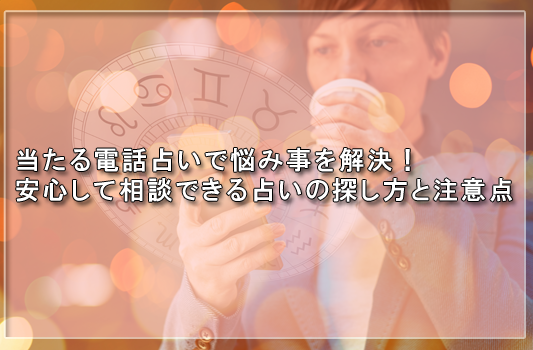悩みが大きくそして深くなるほど、どれだけ信用している友人であっても話すことができないこともあるものです。
「誰にも言えない」「どうやって1人で解決したらよいのか分からない」という方もいらっしゃるかもしまれません。
そんな時でも利用できるのが当たる電話占いランキングなのです。
占い師に鑑定相談をすることで、結果に基づいた鑑定を行ってくれます。
生活に直接的な関わり合いがないので話しやすいのも利点。
ここでは「人に言えない悩みと電話占い」を考えていきます。
本当に占い師は悩みに対して真摯に向き合ってくれるのか
電話越しではありますが、鑑定やアドバイスそのものは対面の占いとほとんど変わらないと考えて良いでしょう。
占いサイトに在籍している占い師は、真摯に利用者と向き合ってくれます。
そのうえで鑑定を進め、その結果に基づいてアドバイスを行ってくれるのです。
誰にも言えない相談事でもぜひとも話してみてください。
倫理的な問題について相談したい場合
不倫や浮気。
世間一般では「倫理に反する行為」とされています。
実際にその最中だという方は、相手が占い師であっっても話を聞いてくれるのか・悪い感情を抱かれるのではないかと不安に感じることでしょう。
しかし、このような内容であっても鑑定不可になったり、嫌悪感を示されることは決してありません。
占い師のプロフィールの中には「得意ジャンル」の中に不倫や浮気と書かれていることもあるのです。
周りに本当に知られず相談できるものなのか
相談内容が繊細であるほど、占い師に話をして周りに知られる可能性が出てこないのかと思うものです。
「絶対に知られたくない」内容であっても、占い師がそれを漏洩させることはありませんので安心してください。
占いサイトに置きましても、個人情報の保護管理をしっかりと行っていますので、この点も問題ないでしょう。
相談時の注意点について
気軽な鑑定スタイルである「電話」という方法。
繊細な相談でも気軽に行っていただけます。
しかし、利用前には注意をしておきたいポイントを抑えておいてください。
以下、そのポイントをまとめていきます。
相談環境について
電話を使って相談をするのですから「周りに人がいない環境」が理想的です。
誰にも知られたくない内容であればなおさらの事。
確実に誰にも聞かれない場所を選んでください。
カード決済から知られないようにすること
鑑定料金の支払いですが、いくつかの方法が提案されています。
その中の1つに「クレジットカード決済」があります。
決済そのものは良いのですが、明細書などが自宅ポストに投函される可能性があります。
ご家族と同居しているなどという場合には、ここから知られてしまう可能性もあるでしょう。
しかし、対策はあります。
明細書を自宅に届かないようにするのです。
いわゆる「ウェブ明細書」というものなのですが、手続きを済ませておくと紙として届くことはありません。
サイトで確認するという形となるのです。
恨みの気持ちを抱いている際は鑑定不可となる場合もある
不倫を例に掲げて考えてみます。
- 奥さんが憎くて別れさせて自分と彼が結婚できるようにしたい
- パートナーが奥さんを選んで憎んでいるから仕返しをしたい
などというものです。
占いは誰かの不幸を願うものではありません。
自分自身が幸せになれる方法を探すものなのです。
もし、憎んだり仕返しを考えるような内容であれば、鑑定不可となる可能性もありますので、改めて自身の心に問いかけてみてください。
結果やアドバイスについて
悩みが深ければ、鑑定結果やアドバイスをすんなりと受け入れられないこともあるものです。
その時は、じっくりと考えなおしたり消化してみるのがオススメです。
